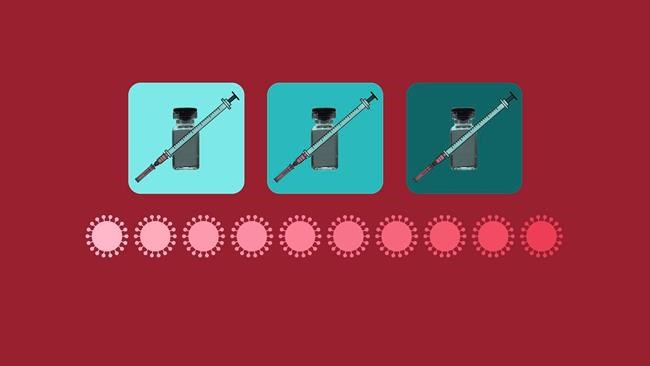How would COVID-19 vaccine makers adapt to variants?
Advertisement
Read this article for free:
or
Already have an account? Log in here »
To continue reading, please subscribe:
Monthly Digital Subscription
$0 for the first 4 weeks*
- Enjoy unlimited reading on winnipegfreepress.com
- Read the E-Edition, our digital replica newspaper
- Access News Break, our award-winning app
- Play interactive puzzles
*No charge for 4 weeks then price increases to the regular rate of $19.00 plus GST every four weeks. Offer available to new and qualified returning subscribers only. Cancel any time.
Monthly Digital Subscription
$4.75/week*
- Enjoy unlimited reading on winnipegfreepress.com
- Read the E-Edition, our digital replica newspaper
- Access News Break, our award-winning app
- Play interactive puzzles
*Billed as $19 plus GST every four weeks. Cancel any time.
To continue reading, please subscribe:
Add Free Press access to your Brandon Sun subscription for only an additional
$1 for the first 4 weeks*
*Your next subscription payment will increase by $1.00 and you will be charged $16.99 plus GST for four weeks. After four weeks, your payment will increase to $23.99 plus GST every four weeks.
Read unlimited articles for free today:
or
Already have an account? Log in here »
Hey there, time traveller!
This article was published 25/02/2021 (1751 days ago), so information in it may no longer be current.
How would COVID-19 vaccine makers adapt to variants?
By tweaking their vaccines, a process that should be easier than coming up with the original shots.
Viruses constantly mutate as they spread, and most changes aren’t significant. First-generation COVID-19 vaccines appear to be working against today’s variants, but makers already are taking steps to update their recipes if health authorities decide that’s needed.

COVID-19 vaccines by Pfizer and Moderna are made with new technology that’s easy to update. The so-called mRNA vaccines use a piece of genetic code for the spike protein that coats the coronavirus, so your immune system can learn to recognize and fight the real thing.
If a variant with a mutated spike protein crops up that the original vaccine can’t recognize, companies would swap out that piece of genetic code for a better match — if and when regulators decide that’s necessary.
Updating other COVID-19 vaccines could be more complex. The AstraZeneca vaccine, for example, uses a harmless version of a cold virus to carry that spike protein gene into the body. An update would require growing cold viruses with the updated spike gene.
The Food and Drug Administration said studies of updated COVID-19 vaccines won’t have to be as large or long as for the first generation of shots. Instead, a few hundred volunteers could receive experimental doses of a revamped vaccine and have their blood checked for signs it revved up the immune system as well as the original vaccines.
More difficult is deciding if the virus has morphed enough to modify shots.
Globally, health authorities will monitor coronavirus mutations to spot vaccine-resistant mutations. They’d also have to decide whether any revamped vaccine should protect against more than one variant.
Overall the process would be similar to what already happens with flu vaccine. Influenza viruses mutate much faster than coronaviruses, so flu shots are adjusted every year and must protect against multiple strains.
___
The AP is answering your questions about the coronavirus in this series. Submit them at: FactCheck@AP.org.
Read previous Viral Questions:
How do we know the COVID-19 vaccines are safe?
Can I take painkillers before or after a COVID-19 vaccine?
What should I know about COVID-19 vaccines if I’m pregnant?


